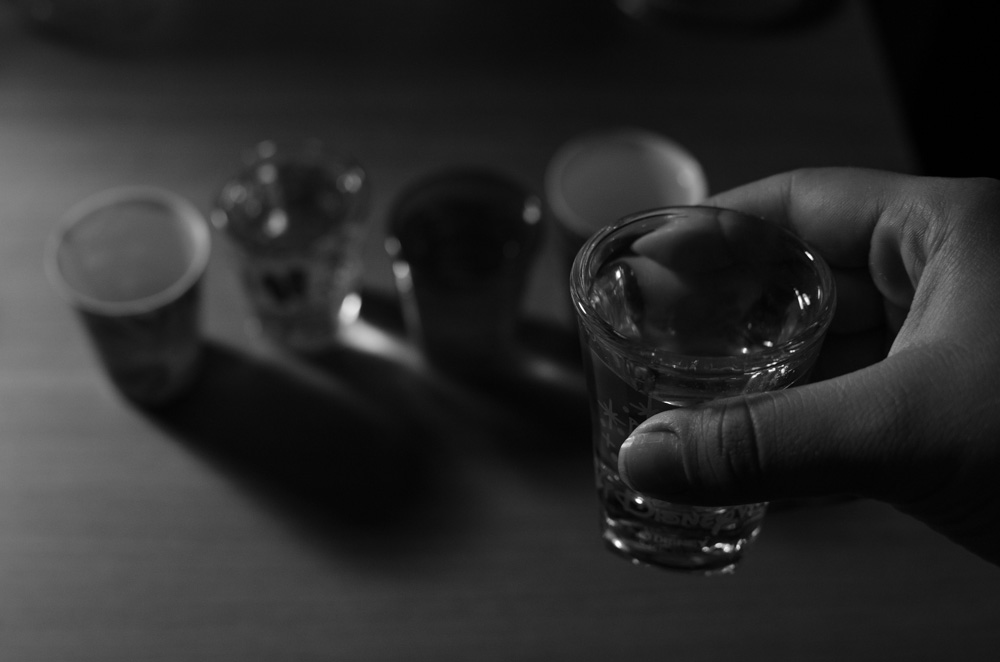Escape in a Bottle
by Taylor Derrisaw | published Sep. 24th, 2014
You walk into an apartment where music is playing, drinks are flowing and people are laughing. This is the night, the one your mother told you to avoid and your best friend told you to go all-out on. You feel stressed from the week before but now it’s time to let it all go.
Drinking alcohol has been tied to college life for years, influencing entire generations to drink heavily and let go of many of the burdens and stressful moments associated with going to school.
Although alcohol can temporarily alleviate some of the stress, depression and anxiety that can come with being in college, it sometimes has negative effects as well. When alcohol enters the bloodstream it travels to every part of the body. According to the National Institute of Health (NIH), when alcohol enters the brain it affects the areas that control movement, speech, judgment and memory, which can lead to a change in behavior, ambiguous speech and loss of memory.
Dependence on alcohol can also lead to poor academic performance. According to a study done by the National Institute on Alcohol Abuse and Alcoholism (NIAAA), “About one quarter of college students report having academic consequences because of their drinking, including missing class, falling behind, doing poorly on exams or papers and receiving lower grades overall.”
As we all know, alcohol consumption can lead to even more serious consequences as well. According to the NIAAA, the consumption of alcohol can lead to death, serious injury and decreased cognitive ability. The NIAAA cites that “Each year, an estimated 1,825 students die from alcohol related unintentional injuries, including motor vehicle crashes.”
According to the Centers for Disease Control and Prevention (CDC), nearly 30 people die every day in crashes that involve an impaired driver.
Despite the consequences of drinking alcohol, almost half of college students report binge drinking while in college. Many students see alcohol as an escape from depression, anxiety or stress, while others simply enjoy the feeling of being drunk. Not all the consequences of drinking alcohol are negative, however; one of the benefits of drinking alcohol moderately is a reduced risk of heart disease, according to the NIH.
According to the Dietary Guidelines for Americans, drinking moderately means consuming approximately one drink per day for women and one to two drinks per day for men. According to the CDC, a standard alcoholic drink is equivalent to 14.0 grams of pure alcohol, and a drink typically stays within the body for two hours, depending on the gender, weight and age of the consumer. Heavy drinking, on the other hand, consists of drinking eight or more drinks per week for women and 15 or more drinks a week for men.
Drinking excessively can have serious consequences for the future and can be the cause of multiple health problems. Although these effects are limited at a younger age, they can have more serious consequences with increased age. According to the NIH, long-term alcohol use can lead to high blood pressure and an increased risk of heart disease.
In addition, the CDC says that some of the long term
Because of these many effects, it is important to know when one’s drinking has gone too far.
A third year liberal arts student at RIT who wished to remain anonymous reported binge drinking in order to quell the emotional pain she had been feeling. “I had kind of hit rock bottom with my life. I was coming out of an incredible and solid two-year relationship,” she said. “I started to drink more at parties because I was beginning to feel a little [lonelier] … I was consuming alcohol at slightly above [my] average rate; going out every weekend to get drunk but never going too far.
“I had a night where I had gotten so drunk I needed to be hospitalized,” she continued. "That experience changed me forever. My friends were scarred from how I acted that night."
As a result of the experience, the student began going to Alcoholics Anonymous meetings. “I refused to let myself drink again until I was doing it for the right reasons instead of doing it to make me feel better,” she said. “I was drinking to escape the problems of my failed relationships and it almost cost me my friends, and they’re the most important people in my life.”
The liberal arts student took the initiative to seek help, but according to the NIAAA, “19 percent of college students between the ages of 18 and 24 met the criteria for alcohol abuse or dependence, but only five percent of those students sought treatment for alcohol problems.” One criterion for alcohol abuse, according to the NIAAA, consists of “… episodic excessive drinking, habitual excessive drinking and alcohol addiction that was characterized by the compulsion to drink and by withdrawal symptoms when drinking was stopped.”
Escape can be found in many forms, often in a bottle of liquor or beer. Although alcohol can be a viable method of escape from stress or drama, it’s important to be safe and consider many of the negative effects associated with drinking, or eventually you might find yourself in need of an escape from alcohol, too.



